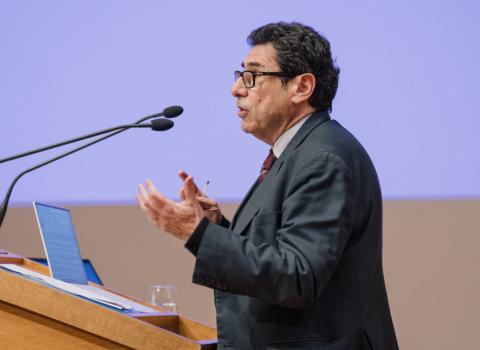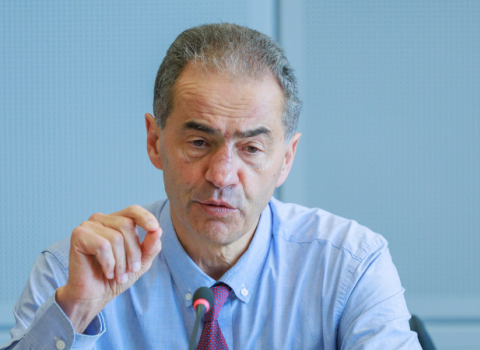Imperial’s President Alice Gast says the UK must continue to be at the heart of the European Research Council (ERC) to remain a science superpower.
President Gast said: "As the UK looks to negotiate a new partnership with our European neighbours and navigate the next phase of the pandemic, it is crucial that we consider the importance of maintaining and strengthening links which have benefitted UK science so much over the last few decades.
"To ensure our success as a science superpower in the future, the UK must continue to be at heart of the ERC.”
Funding from the ERC has been critical to many of Imperial’s major research projects, which are highlighted in a new booklet of case studies demonstrating Imperial’s world-leading impact.
President Gast added: "The future of science, and our success in solving global challenges, will depend on international cooperation.
"The COVID-19 crisis has particularly demonstrated the value of collaboration, as well as the importance of world-leading frontier research to our future health and prosperity.”
ERC funding: Long-term support for leading scientists
Professor Molly Stevens has been supported throughout her career by the ERC and now leads a research group made up of academics from over 25 countries. Together they use transformative bioengineering approaches that will overcome severe limitations in current materials in two main areas: Biosensing and Regenerative Medicine.
Professor Stevens, from the Departments of Materials and Bioengineering, has been supported by a Starting Grant (2007); Proof of Concept (2011); Consolidator Grant (2013); Proof of Concept (2017) and Proof of Concept (2019).
Professor Stevens said: “I am exceptionally grateful for the long-term support that the ERC has provided me with since the early days of starting my independent group. Its support has been essential in helping us to build an internationally recognised vibrant research activity.”
ERC funding: Supporting innovative research
Professor Ferdinando Rodriguez y Baena first benefitted from an ERC Starting Grant in 2010, and with its support has developed a prototype robotic needle which is flexible enough to curve – enabling it to get to hard-to-reach places deep in tissue, for example for drug delivery in neurosurgery.
As a result of his ERC-funded research, Professor Rodriguez y Baena now represents the UK in two current European Commission networks, Terrinet and DIH-HERO, which have been important schemes in building research links across Europe.
Professor Rodriguez y Baena, from the Department of Mechanical Engineering, said: “Put simply, an ERC award is by some margin the best single investigator grant any young academic could hope for, with funding magnitude, project duration, and research freedom which are second to none. International prestige is a key outcome of ERC funding and I would unequivocally say that the connections I secured through this research have been instrumental in my progress to be an international leader in my field.”
ERC funding: Building international networks
Professor Carol Propper, from the Business School, won an Advanced Grant in 2017, and this builds on many years of research seeking to understand how we can improve the operation of public services and services delivered by the state.
Professor Propper said: "My research, has built a network of partners within and outside the EU. Currently, my collaborators include academics located at Imperial, the universities of Bristol and Lancaster and the Institute for Fiscal Studies in the UK, Harvard and MIT in the USA, and Monash University and University of Queensland in Australia."
ERC Funding: Facilitating collaboration
Professor Guillermo Rein specialises in research focusing on various aspects of urban fires and wildfires. Professor Rein is creating technology that will reduce the burden of smouldering fires, through better understanding of peat fires, computer models to simulate spreading of fires, and prevention and quick detection systems.
Professor Rein said: "I can say from my experience that being an ERC grantee gives kudos to my research and greatly facilitates collaboration with other academics across disciplines, both nationally and around the world.”
Download the Imperial ERC case study booklet
This article was first published on 21 July by Imperial College London.





 A unique international forum for public research organisations and companies to connect their external engagement with strategic interests around their R&D system.
A unique international forum for public research organisations and companies to connect their external engagement with strategic interests around their R&D system.